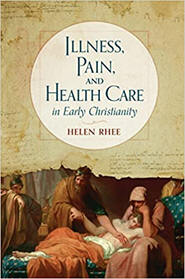Catholic Medical Quarterly Volume 73(2) May 2023
Book Review
Illness, Pain, And Health Care in Early Christianity
by Helen Rhee. Published Eerdmans.
Reviewed by Pravin Thevasathan
 This
is a very informative work on the early Christian approach to illness,
pain and healthcare.
This
is a very informative work on the early Christian approach to illness,
pain and healthcare.
The author notes that the Greco-Roman medical traditions as exemplified by Hippocrates and Galen had a naturalistic understanding of disease. In contrast, the Jewish Old Testament tradition had a spiritual understanding of illness: illness is caused by divine punishment for sin. What is required above all else is repentance. In contrast, the early Christians saw illness in biological terms. The patient needed health care. By the fourth century, hospitals were built by the Christian communities especially in the East Roman Empire. There was care of the poor, the sick and the migrants. The hospitals were under the authority of the bishop and were often managed by monks and nuns. Care of the sick was free.
The sections describing Saint Augustine's understanding of illness is especially beautiful. For this great saint, pain is not merely biological as it is the immortal soul that experiences pain. Our pain can be united with the sufferings of Christ: " Whatever he suffered, we too suffer in him, and whatever we suffer, he too suffered in us."
Naturalistic explanations were broadly used by the Fathers of the Church to explain pain and illness. For Origen, food in the wrong quantity can cause fever. For John Chrysostom, fever is caused by a superabundance of bile. Gregory of Nyssa had recourse to naturalistic explanations for pathological conditions.
Following Hippocrates and Galen, the Fathers gave naturalistic explanations for mental illness. John Chrysostom saw madness and dementia as having a humeral pathology. For Nemesius, anger is due to an excess of bile and what is needed is diet and exercise.
But the Fathers were also willing to see illness as a punishment from God. The Fathers also taught that illness enables us to practice the virtues, especially humility. We can also unite our sufferings to the sufferings of Christ. The ascetics saw illness as a means of curtailing pleasure.
This book gives us excellent examples of how the early Christian tradition turned to both the Jewish and Greek traditions in its understanding of illness and pain.
